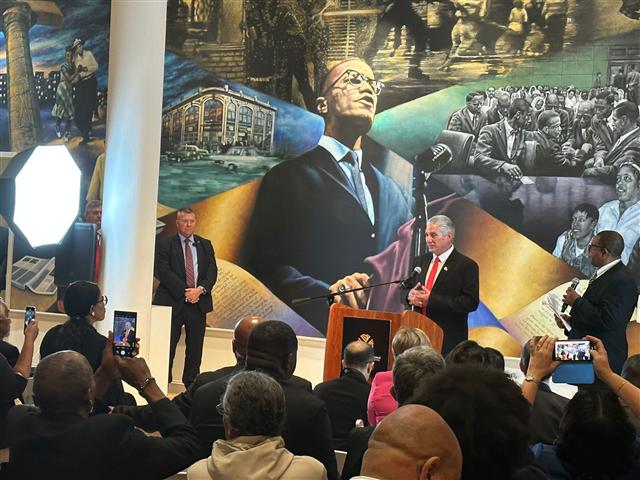For Fidel and Cuba, Malcolm X also defied the imperial powers, said the president, who assured that the Cuban Revolution would never forget his role in inviting him and his delegation to the Theresa Hotel, in the heart of the black neighborhood of Harlem, when there was an attempt to boycott his presence at the United Nations in 1960.
The head of State expressed that this generous and fraternal gesture culminated in the historic meeting between Malcolm X and Fidel in September of that year.
“For these and many other reasons, which go without saying, we have come to honor Malcolm X and, with him, pay tribute to our African-American brothers and sisters, the people of the United States, those who are fighting for justice, against exploitation and segregation. All those who, like Malcolm, believe that a better world is possible,” Díaz-Canel stressed.
He later added: “Let us all honor the memory and legacy of Malcolm X as a commitment to those who have suffered and still suffer from poverty, injustice, and exclusion, those who have suffered and still suffer from colonialism, neo-colonialism, imperialism, exploitation, racism, and selfishness.” He also expressed his gratitude for the support of the United States people in the struggle against the blockade the US Government has imposed on Cuba for more than six decades.
Earlier, Dr Ilyasah Shabazz, daughter of Malcolm X, referred to Díaz-Canel’s presence at the Center and said this visit continues a legacy of solidarity.
“My father was a great admirer of Fidel Castro,” Shabazz pointed out, emphasizing that he always admired how he could liberate his people from the yoke of imperialism, so close to the United States.
Upon his arrival, Díaz-Canel laid a wreath to Malcolm X, and shortly before leaving, he attended the unveiling of a plaque and went to the spot in the same hall, where a small podium with white flowers commemorates the place where he was assassinated on February 21, 1965.
jrr/iff/oda/dfm










